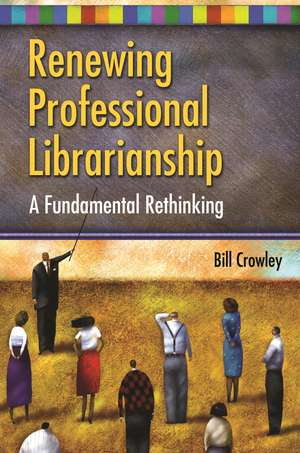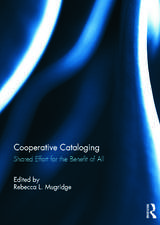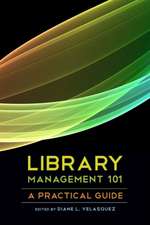Renewing Professional Librarianship: A Fundamental Rethinking: Beta Phi Mu Monograph Series
Autor Bill Crowleyen Limba Engleză Paperback – 29 mar 2008 – vârsta până la 17 ani
Preț: 256.12 lei
Preț vechi: 330.48 lei
-23% Nou
Puncte Express: 384
Preț estimativ în valută:
49.01€ • 51.54$ • 40.50£
49.01€ • 51.54$ • 40.50£
Carte tipărită la comandă
Livrare economică 16-30 aprilie
Preluare comenzi: 021 569.72.76
Specificații
ISBN-13: 9781591585541
ISBN-10: 1591585546
Pagini: 184
Dimensiuni: 156 x 235 x 14 mm
Greutate: 0.3 kg
Editura: Bloomsbury Publishing
Colecția Libraries Unlimited
Seria Beta Phi Mu Monograph Series
Locul publicării:New York, United States
ISBN-10: 1591585546
Pagini: 184
Dimensiuni: 156 x 235 x 14 mm
Greutate: 0.3 kg
Editura: Bloomsbury Publishing
Colecția Libraries Unlimited
Seria Beta Phi Mu Monograph Series
Locul publicării:New York, United States
Notă biografică
Bill Crowley, Professor, Graduate School of Library and Information Science Dominican University, River Forest, Illinois.
Cuprins
AcknowledgementsChapter 1: IntroductionChapter 2: Librarian Professionalism and Professional Library EducationChapter 3: "What's the Story?"Chapter 4: The Information-Library ConundrumChapter 5: The Ebbing of Information ScienceChapter 6: Restoring the Balance
Recenzii
Crowley's tome is recommended for library schools and profesional collections.
Crowley has given this book great thought. He poses question after question. Are we meeting the needs of our public in the academic, school, corporate, and public arenas? Should the information specialist and the librarian unite or be seperate entities?. . . Is your state or county using the excuse of lack of funds for not hiring a librarian or for eliminating librarian aide positions? The author encourages the reader to take the challenge to do something about it. . . . This book would also be valuable as a text for graduate school courese. Recommended.
As the way people deliver and access information changes, what happens to one of librarians' fundamental roles, that of information provider? In Renewing Professional Librarianship: A Fundamental Rethinking, Bill Crowley explains how librarianship needs to move away from an infocentric model and towards a lifecycle librarianship that promotes reading and life-long learning. In many libraries, this change is already underway (as in the shift from reference to readers' advisory in public libraries). It's Crowley's contention that more needs to be done to promote the shift at the professional education level, and he calls on ALA to adopt an accreditation process that places less emphasis on information science.
In his latest work, Bill Crowley challenges library and information science educators to examine the curriculum offered in American Library Association-accredited graduate programs, asserting that 'information'-centered education is crowding out 'library' education. While the text can be verbose at times, Crowley defends his position with data, research, and anecdotes culled from the past 50 years of the profession. He draws a haunting parallel between the current conditions of North American library education with the non-existence of 'library' in the United Kingdom's institutions of information science. At its core, the book is an examination of the cultural disconnections between the needs and requirements of academia and the need for practical education of future academic, public, and school librarians. If programs for obtaining formal education in the history and applications of librarianship are swallowed whole by the desires of 'information' scholars, how will these programs prepare librarians to run libraries in the future? Crowley's message creates opportunities for debate in classrooms and work rooms across librarianship; the age old topic of examining the 'L' word is still alive today.
This book is a timely and incisive critique of professional librarianship and library education. In his deep concern for the profession, Crowley remains optimistic. Readers will find his message thought provoking, if not controversial. Besides being an engaging read, Crowley's scholarly approach has produced an extensive bibliography of literature that readers may explore more thoroughly as they consider his perspective and arguments. This book's far-reaching message and high regard for the best in the library profession make it an appropriate addition to the Beta Phi Mu Monograph Series.Renewing Professional Librarianship is a significant contribution to the library literature and it deserves the serious attention of professional librarians and library educators. It is an essential addition to collections supporting LIS programs.
This book does not provide step-by-step solutions, but is intended as more of a conversation starter. It is has a strong academic tone to it, but I still recommend it to anyone interested in the future of libraries and librarians. It would be a useful addition to a library system's professional collection and definitely has a place in every library school's collection.
. . . worth reading in order to encourage librarians and others to reconsider the direction which libraries are taking -- before the 'L-word' disappears altogether from human experience.
. . . many of his arguments are worth considering and will strike a chord with some in the profession . . . Indeed most readers will find something of interest while many will be stimulated, enraged and/or engaged by Crowley's opinions. Moreover, when a current dean of an ALA accredited programme and former Head of a British school opines that 'there is [a] pretty solid academic justification for spinning off librarianship programs from the major research universities and locating them in vocational education institutions' (Cronin, 1995) there is a need to hear from those who want to maintain and justify the value and values of the library profession. Crowley clearly cares passionately about the future of the profession and those it serves. . . . Library and information professionals should read his rumbustious text and, where they feel he has made a valid case, take up his challenge to do something about it.
This provocative book addresses important issues and clearly belongs in all library and information science collections.
Crowley has given this book great thought. He poses question after question. Are we meeting the needs of our public in the academic, school, corporate, and public arenas? Should the information specialist and the librarian unite or be seperate entities?. . . Is your state or county using the excuse of lack of funds for not hiring a librarian or for eliminating librarian aide positions? The author encourages the reader to take the challenge to do something about it. . . . This book would also be valuable as a text for graduate school courese. Recommended.
As the way people deliver and access information changes, what happens to one of librarians' fundamental roles, that of information provider? In Renewing Professional Librarianship: A Fundamental Rethinking, Bill Crowley explains how librarianship needs to move away from an infocentric model and towards a lifecycle librarianship that promotes reading and life-long learning. In many libraries, this change is already underway (as in the shift from reference to readers' advisory in public libraries). It's Crowley's contention that more needs to be done to promote the shift at the professional education level, and he calls on ALA to adopt an accreditation process that places less emphasis on information science.
In his latest work, Bill Crowley challenges library and information science educators to examine the curriculum offered in American Library Association-accredited graduate programs, asserting that 'information'-centered education is crowding out 'library' education. While the text can be verbose at times, Crowley defends his position with data, research, and anecdotes culled from the past 50 years of the profession. He draws a haunting parallel between the current conditions of North American library education with the non-existence of 'library' in the United Kingdom's institutions of information science. At its core, the book is an examination of the cultural disconnections between the needs and requirements of academia and the need for practical education of future academic, public, and school librarians. If programs for obtaining formal education in the history and applications of librarianship are swallowed whole by the desires of 'information' scholars, how will these programs prepare librarians to run libraries in the future? Crowley's message creates opportunities for debate in classrooms and work rooms across librarianship; the age old topic of examining the 'L' word is still alive today.
This book is a timely and incisive critique of professional librarianship and library education. In his deep concern for the profession, Crowley remains optimistic. Readers will find his message thought provoking, if not controversial. Besides being an engaging read, Crowley's scholarly approach has produced an extensive bibliography of literature that readers may explore more thoroughly as they consider his perspective and arguments. This book's far-reaching message and high regard for the best in the library profession make it an appropriate addition to the Beta Phi Mu Monograph Series.Renewing Professional Librarianship is a significant contribution to the library literature and it deserves the serious attention of professional librarians and library educators. It is an essential addition to collections supporting LIS programs.
This book does not provide step-by-step solutions, but is intended as more of a conversation starter. It is has a strong academic tone to it, but I still recommend it to anyone interested in the future of libraries and librarians. It would be a useful addition to a library system's professional collection and definitely has a place in every library school's collection.
. . . worth reading in order to encourage librarians and others to reconsider the direction which libraries are taking -- before the 'L-word' disappears altogether from human experience.
. . . many of his arguments are worth considering and will strike a chord with some in the profession . . . Indeed most readers will find something of interest while many will be stimulated, enraged and/or engaged by Crowley's opinions. Moreover, when a current dean of an ALA accredited programme and former Head of a British school opines that 'there is [a] pretty solid academic justification for spinning off librarianship programs from the major research universities and locating them in vocational education institutions' (Cronin, 1995) there is a need to hear from those who want to maintain and justify the value and values of the library profession. Crowley clearly cares passionately about the future of the profession and those it serves. . . . Library and information professionals should read his rumbustious text and, where they feel he has made a valid case, take up his challenge to do something about it.
This provocative book addresses important issues and clearly belongs in all library and information science collections.















